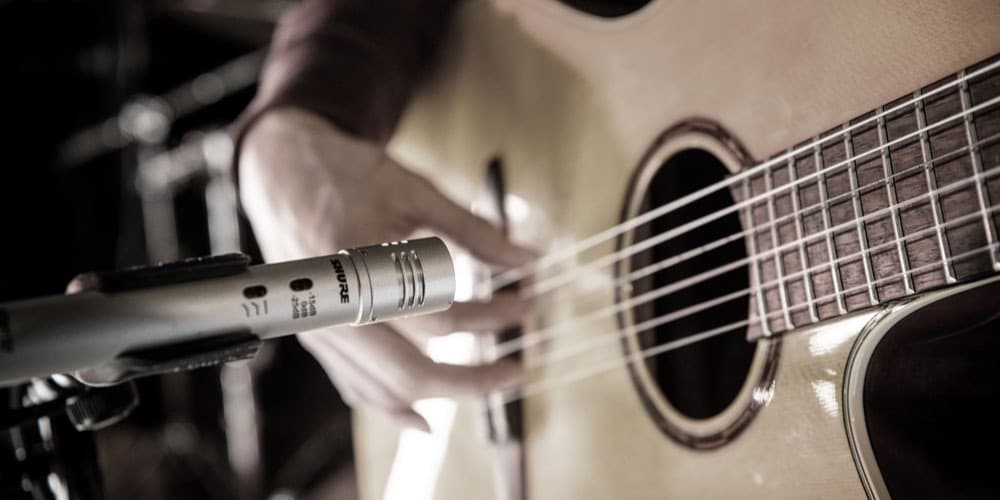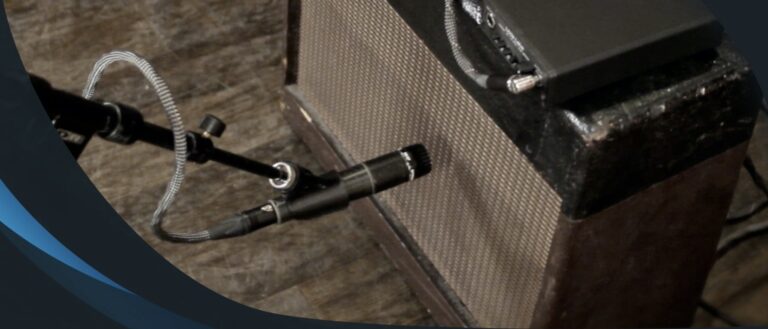Last Updated on January 15, 2023 by IDS Team
The best mics for electric guitar of 2023 show some studio classics which can turbocharge your recording. Though there are lots of options out there, sometimes the choice can be overwhelming. When recording guitar, it’s especially important to use the right mic to ensure sound translates the way you want it to – and electric guitar needs very different recording techniques to steel or acoustic. However, if electric is your instrument, read on for a rundown of what’s out there.
Best Mics for Electric Guitar – Beginners: Shure SM57
This mic regularly makes the top ten or top five lists and for good reason. The SM57 is a classic which is durable and easy to learn. Many pro studio engineers recommend it for beginners, both for its intuitive capacity and the fact it’s under 100 pounds. As a result, it’s easy to replace if broken – however, it’s also unlikely to do so in the first place. It’s robust and its one drawback is sometimes it can pick up unwanted noise, but its quality is actually very high for a mic of its price.
Many beginners pick up a Shure SM57 not knowing much about mics only to find it’s one of the most trusty bits of gear in their studio. It’s also proven to be great on tour, able to withstand the knocks and stresses of the road.
Price and availability: Check Reverb.com by clicking here.
Specifications: 40-15,000 Hz cardioid microphone

Best Overall Mic: Sennheiser e906
This is a great mic which works for drums and other instruments as well. Its versatility is good if you need to record multiple instruments and can’t afford a specialised mic for each one. Sennheiser created a unique shape designed for guitar amps, presenting a broad and flat surface which means you can use it without a stand. In addition, its presence filter helps you adjust the amount of presence – great if you have instruments which are sounding a little dull or lifeless. In fact, this mic is great at breathing life into just about anything. It’s extremely flexible and responsive as well, meaning fast it can withstand fast punchy riffs or jolts of sound.
The Sennheiser e906 is actually a super-cardioid mic, meaning it is hyper-sensitive to sound coming from the direction in which it is pointing. This means it can get crystal clear tones from this spot alone, filtering out unwanted noise from other areas. This precision makes it absolutely amazing in the studio.
Price and availability: Check Reverb.com by clicking here.
Specifications: 40 – 18,000 Hz super-cardioid mic
Best Mics for Electric Guitar – Heavy: Royer 121 / Peluso R14
The biggest challenge of recording heavy guitars is the fact mics can easily blow out. The full force of sound coming from a Marshall stack is often too much for many mics especially if placed too close. Hard rock and metal lovers recommend both the Royer and the Peluso for their durability and reliability, ensuring many tours and recording sessions without any problems. Both are on the expensive side, yet have very similar properties. As a result, if you can’t track one down, you might be able to substitute the other without too much change in the end result.
Price and availability: Check Reverb.com for a Royer by clicking here, and for Peluso click here.
Specifications: 30 – 15,000 Hz figure 8 ribbon mic (Royer 121), 30 – 16,000 Hz figure 8 ribbon mic (Peluso R14)
Best for Soft/Vintage Guitar: AKG C451
This mic normally has a reputation as being a drummer’s mic and is especially good for recording cymbals, however, many musicians have begun to use it for acoustic as well as gentle, softer electric guitar. Why is it so versatile and how does it work so well? This is a mic which focuses on the high-end. It’s great at bringing colour to dull sounds. And as a result, it means that you can capture vintage or more low-key guitars in all their glory. The AKG C451 adds sparkle to this kind of guitar when undertones and overtones get lost in warmth and fuzz.
Price and availability: Check Reverb.com by clicking here.
Specifications: 20 – 20,000 Hz cardioid mic
Best Overall Ribbon Mic: Beyerdynamic M160
This is a ribbon mic with a difference. Instead of being a figure eight cardioid mic, it’s a hyper-cardioid. For those who are not familiar, your average cardioid mic pics up sound in a figure eight pattern. This means that you get lots of natural reverb but can also get some unwanted room noise if there isn’t good enough soundproofing. Supercardioid mics like the e906 focus the pickup of sound on one area, but hyper-cardioid mics are a type of super-cardioid which focus these even more tightly, meaning with the M160 it’s really easy to direct and point this mic to get the exact sounds you want.
This mic was actually the one which recorded the legendary drums on Led Zeppelin’s When The Levee Breaks and has been around since 1957 but it is also a favourite for recording engineers to use on guitar amps.
Price and availability: Check Reverb.com by clicking here.
Specifications: 40 – 18,000 Hz, hyper-cardioid ribbon mic.
Final Thoughts
Ultimately these mics give good variety in terms of what you use them for. Although not all of them are specifically from 2023, they’re all highly relevant and useful bits of gear which will serve you well. You can use the Shure, Sennheiser, and Beyerdynamic for multiple instruments and styles whilst the other two are also adaptable based on your playing flexibility. One thing’s for sure – these bits of gear will be useful for years to come.
Liked this article? We have more about hardware for recording here.



